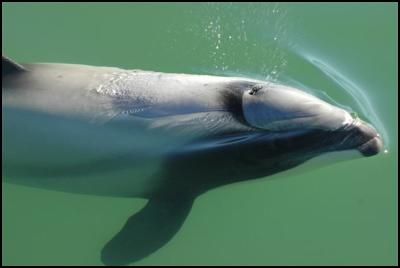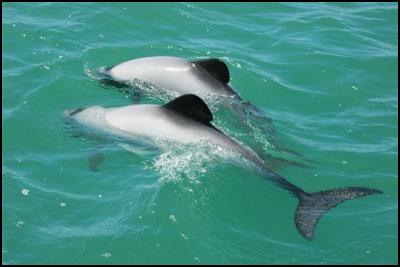Hope for critically endangered Maui’s dolphin
New research provides increased hope for critically endangered Maui’s dolphin
North Island Maui’s dolphins and South Island Hector’s dolphins were once thought to occupy completely separate stretches of New Zealand’s coastline, but new research has shown that two female Hector’s dolphins have been visiting their North Island relatives.
Researchers hope that the two closely related dolphin sub-species may breed, bringing much-needed genetic diversity to the critically endangered Maui’s dolphin population.
“We know that Maui’s dolphins have a limited pool of genetic diversity, so any new input is very welcome,” says Phil Brown, the Department of Conservation’s Maui’s Dolphin Recovery Group leader.
“Maui’s dolphins remain classified as a unique sub-species and this recent finding will not change how we manage the small, fragmented population of less than 150 individuals,” he says.
“Maui’s and Hector’s dolphins have been genetically separate for more than 15,000 years, and even if occasional breeding with Hector’s occurs, it won’t change the makeup of the entire population.”
The two dolphins were identified during the first stage of a Maui’s dolphin population estimate study carried out by the Department of Conservation, the University of Auckland and Oregon State University in February this year. The study is using DNA profiling to identify individual dolphins.
“At first we didn’t know whether they were Maui’s dolphins that had retained some Hector’s genes, or whether they were visiting Hector’s straying outside their usual range,” says Mr Brown.

Thanks to genetic analysis that has just been completed by scientists from both universities, it is now possible to confirm that the two dolphins were in fact Hector’s dolphins.
Auckland University’s Dr. Rochelle Constantine presented the findings today at the New Zealand Ecological Society conference in Dunedin.

Future surveys would be necessary to determine if the two female dolphins survived, and if they are able to breed successfully with Maui’s dolphins.
To understand more about marine mammals in our waters we need more information about them. Mr Brown urges anyone who sees a Maui’s dolphin to report the sighting by calling the DOC HOTline (0800 362 468).
ENDS


 Gordon Campbell: On The Making Of King Donald
Gordon Campbell: On The Making Of King Donald Greenpeace: Shane Jones Indicates NZ's Entire EEZ Now Open For Oil And Gas Free-for-All
Greenpeace: Shane Jones Indicates NZ's Entire EEZ Now Open For Oil And Gas Free-for-All Ngati Kahungunu Iwi Inc: Kahungunu Submission Rejects The Regulatory Standards Bill In Its Entirety
Ngati Kahungunu Iwi Inc: Kahungunu Submission Rejects The Regulatory Standards Bill In Its Entirety Fire and Emergency NZ: Older People Are More Likely To Die In A House Fire This Winter - Check They Are Fire Safe Today
Fire and Emergency NZ: Older People Are More Likely To Die In A House Fire This Winter - Check They Are Fire Safe Today The Reserve Bank of New Zealand: Statement from RBNZ chair Neil Quigley about OIAs on Adrian Orr's resignation
The Reserve Bank of New Zealand: Statement from RBNZ chair Neil Quigley about OIAs on Adrian Orr's resignation Deep Sea Conservation Coalition: Protected Corals Destroyed In Six-Tonne Bycatch “Disaster” From A Single Bottom Trawl
Deep Sea Conservation Coalition: Protected Corals Destroyed In Six-Tonne Bycatch “Disaster” From A Single Bottom Trawl Aroturuki Tamariki: Report On Outcomes For Tamariki And Rangatahi Māori In The Oranga Tamariki System – A Story Of Consequence
Aroturuki Tamariki: Report On Outcomes For Tamariki And Rangatahi Māori In The Oranga Tamariki System – A Story Of Consequence


